Michael Connett's Wellington Talk
Mark Honeychurch - 18th February 2025
A week ago I attended a talk given by Michael Connett, the son of long-time lawyer Paul Connett. Michael, like his father, lives in the US and has dedicated his life to fighting against the use of community water fluoridation. He’s a lawyer, and specialises in civil lawsuits where there are claims of damage by toxic substances. He recently won a court case in the US where he argued that the EPA (Environmental Protection Agency) was not doing enough to address concerns about the risks of fluoride in drinking water.
On the back of this win, and the recent change to more sympathetic governments in both the US and NZ, Fluoride Free NZ arranged to fly Michael Connett over and give a series of talks around the North Island. Some of these talks were to community groups, and others were to local councils such as Whangarei and Rotorua, where sadly it sounds like the anti-fluoride message is finding fertile ground.
The event I attended, held at the University of Victoria Law School, was the last of the tour. As the tour had only covered the North Island, this talk was live-streamed to several venues in the South Island, as well as out of the way places in the North Island such as Gisborne. The organisers asked for a gold coin donation, so I managed to stump up a dollar in shrapnel from the office. In the end I just walked into the venue and kept my money in my pocket. It’s always nice when giving money to these anti-science causes can be avoided.
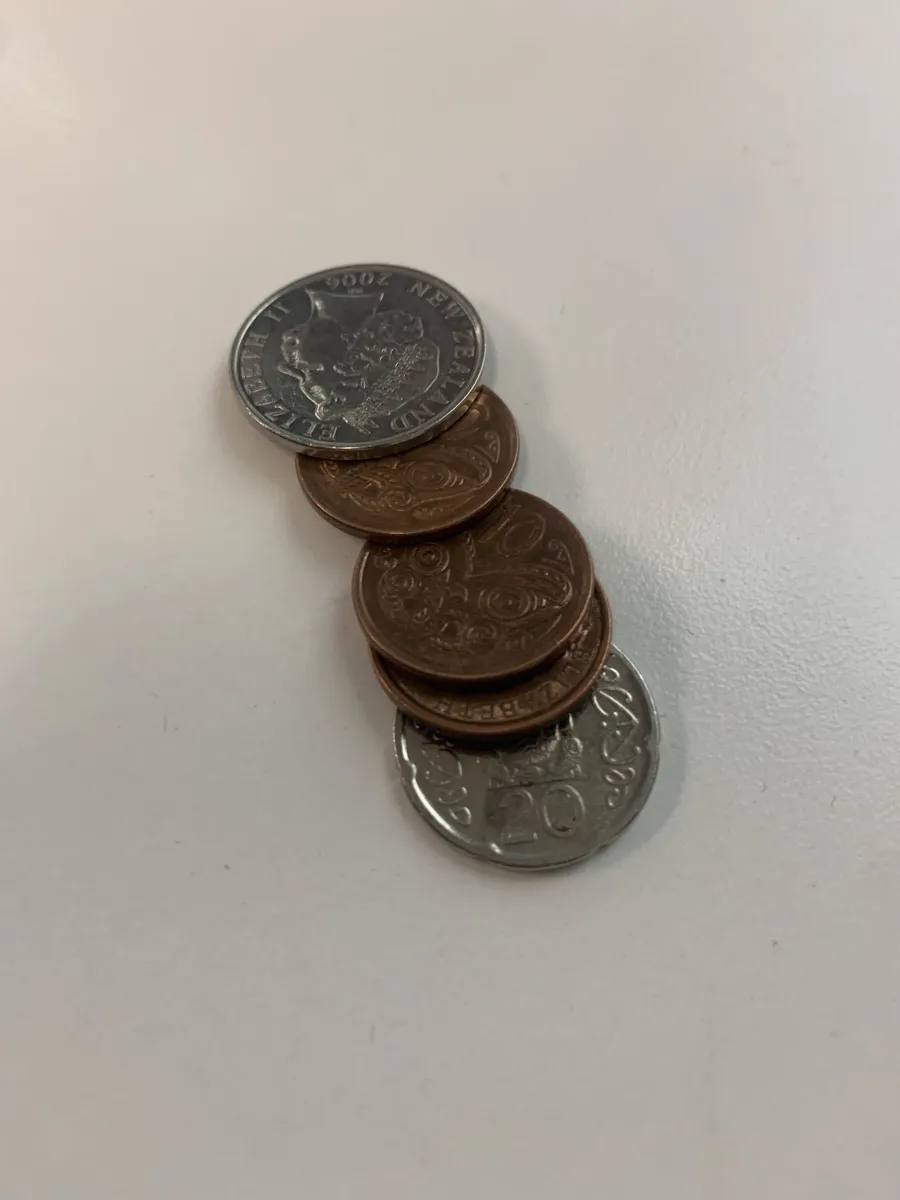
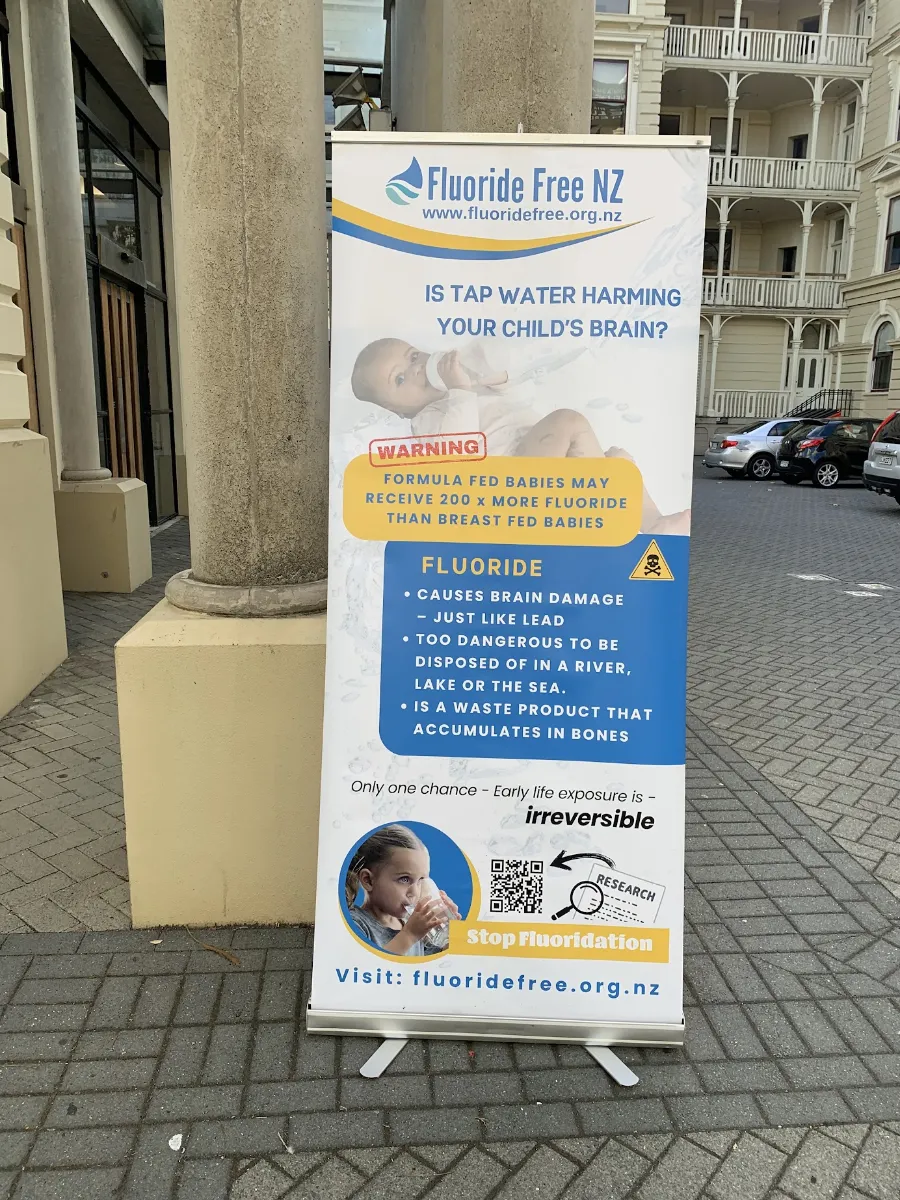
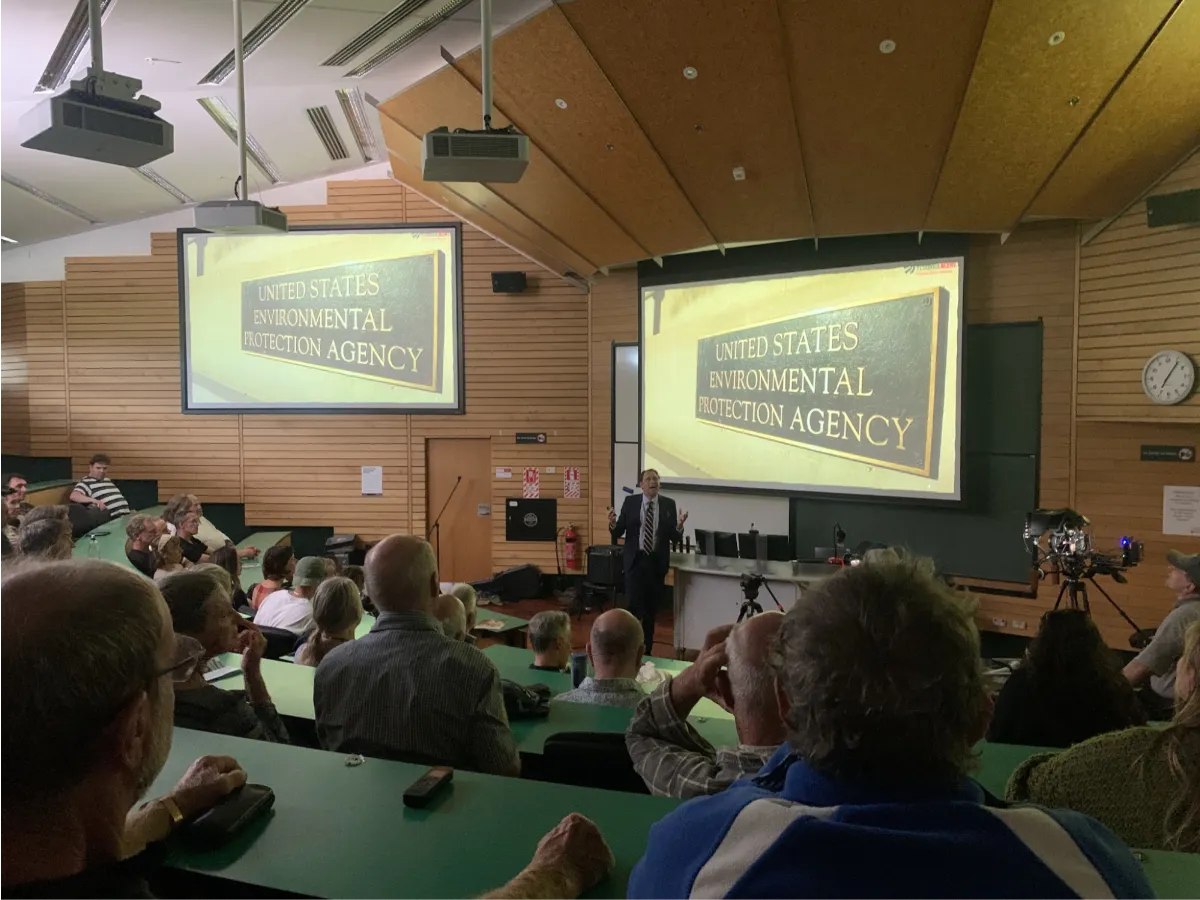
Michael’s talk was mainly about his court case, and he did a really good job of presenting his story in a way that was very engaging. As a lawyer, I guess he’s learned to have a manner that is warm and inviting, making you trust what he’s saying. He was dynamic and funny, and did a great job of weaving a convincing narrative. I’ve been to see his father Paul speak in the past, and Michael is definitely much better at this than his father.
It’s interesting what happens in my brain at events like this. When a pseudoscientific case is well-presented, and has all the hallmarks of a legitimate, truthful presentation, I find my brain starting to be swayed by what I’m listening to. It doesn’t happen often - most of the talks I go to are so far-fetched that it’s impossible to even begin to connect with their message. But just occasionally, when the topic is one that has a lot of people on both sides, and when the arguments used are very subtle, calling for small policy changes or simply additional caution, I find myself sympathising with the arguments being made. Believe it or not, I’ve even had this with an anti-vaccine talk in the past, one that simply preached a slow approach to vaccine rollouts rather than saying that vaccines cause autism, or are being used as population control.
What I often find with these talks, and this one was no exception, is that come question time the audience will quickly snap you back to reality, and make you realise that you’re in a room full of people who hold a panoply of outlandish beliefs. And, however much the speaker’s message may have been nuanced and sympathy-inducing, their ideas have attracted supporters who nobody in their right mind could consider rational. And so it was in this case, where most of the audience seem to have been known to the organisers of Fluoride Free NZ.
When it came to question time the head of Fluoride Free NZ, Mary Byrne, first invited Matt Shelton, one of the NZDSOS doctors who spoke up against vaccination during the height of the COVID pandemic, to talk for a few minutes. He mentioned the Manhattan Project, mumbling about it being the origin of water fluoridation. I think he’d probably read the article on the Fluoride Action Network website from 1997.
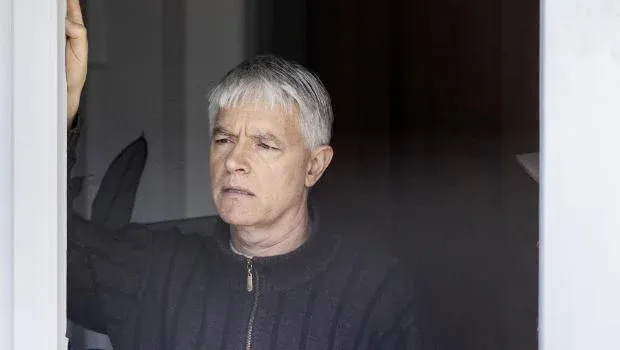
He also talked about how supposedly chemical companies in New Zealand had been warned that if fluoridation was stopped, they would see a major drop in their profits. I figured it would be worth doing a mini fact-check on this one…
The Ministry of Health estimates that the entire fluoridation process costs around $2.60 per person per annum in NZ. This would work out to roughly $13 million a year if we fluoridated the entire country’s water supply (and if everyone lived somewhere with a population of 500 or more). However, only part of this cost is the purchasing of the hydrofluorosilicic acid, which is what is added to the water to fluoridate it. The best estimate for this that I could find was from way back in 1999, and was an estimate of 18c per person per annum. Roughly doubling this to 40c to account for inflation, etc since 1999, and then multiplying it by a population of around 5 million, gives us an estimated $2 million cost for the hydrofluorosilicic acid.
The companies selling hydrofluorosilicic acid in New Zealand will have certain costs involved with creating and purifying the product, even if it’s a toxic waste product - in fact, especially if it’s a toxic waste product, as the cost of doing this work safely will likely be quite high. If we generously assume that these companies are making a 25% profit margin on each sale (which seems unlikely), this would come to a total of $500,000 a year. If Ixom, a chemical supplier in New Zealand, is the only company selling hydrofluorosilicic acid, then they stand to lose this profit. But given that Ixom was recently sold for AU$777 million, and then subsequently refinanced for $1 billion, I have to assume that this lost revenue, although not great for their bottom line, wouldn’t be a major concern for the company.
Apparently Matt has to appear in front of a Tribunal in a couple of weeks, although I couldn’t find any details online to confirm this or figure out what the Tribunal is about. Hopefully the media picks up on the story when it happens.

Councillor Ray Chung from Wellington City Council was at the event. He asked a question about how he should go about getting the other councillors on board with the idea that the Council should defy the government’s directive and stop fluoridating our water supply (funnily enough, Wellington has only recently restarted fluoridating the water, after it had quietly stopped the procedure for a year or so). The answer he received was that there’s little chance of convincing a council like Wellington’s, and that efforts would be much better spent in places like Whangarei and Rotorua.
New Health New Zealand (who have been involved in court cases in the past trying to make councils stop fluoridating) was represented by someone I didn’t recognise, as was Reality Check Radio - the media outlet of Voices for Freedom. Their questions were unmemorable.
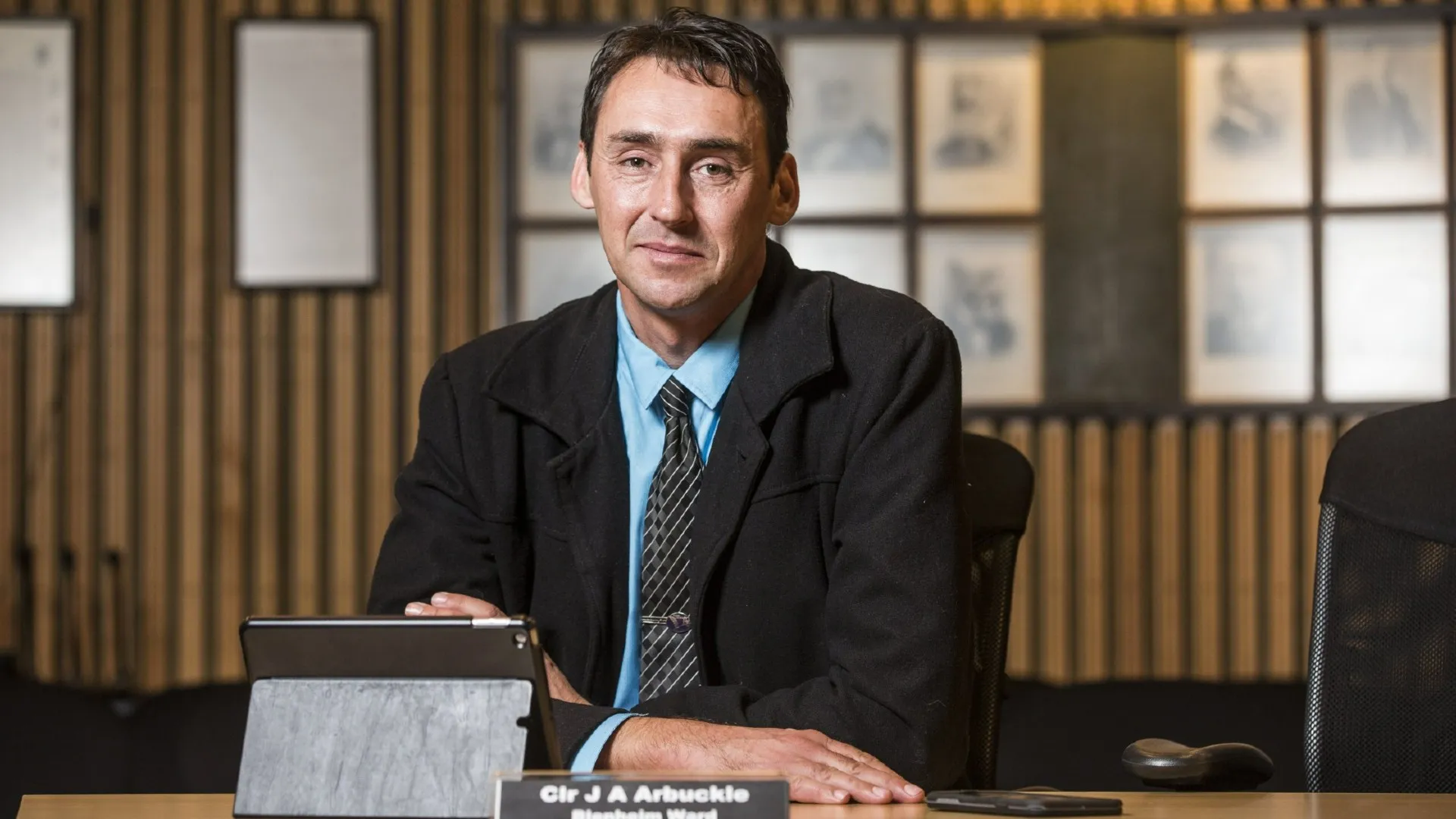
NZ First MP Jamie Arbuckle was in the audience, although I only found about this later on from a Fluoride Free NZ newsletter. He and other NZ First MPs, including Winston Peters, accepted a petition from Fluoride Free members the day after the talk, after which a Members Bill was submitted that would repeal the “Health (Fluoridation of Drinking Water) Amendment Act 2021”, effectively moving fluoridation decision-making back to local councils.
Time will tell whether this spurt of activity will lead to any actual change, but given our current coalition government’s fondness for alternative medicine and non evidence-based policies, I’m starting to get a little concerned that maybe the anti-fluoride message will gain enough traction to actually end up in changes being made to the law. And those changes are going to be bad for the many people in New Zealand who stand to benefit from community water fluoridation.